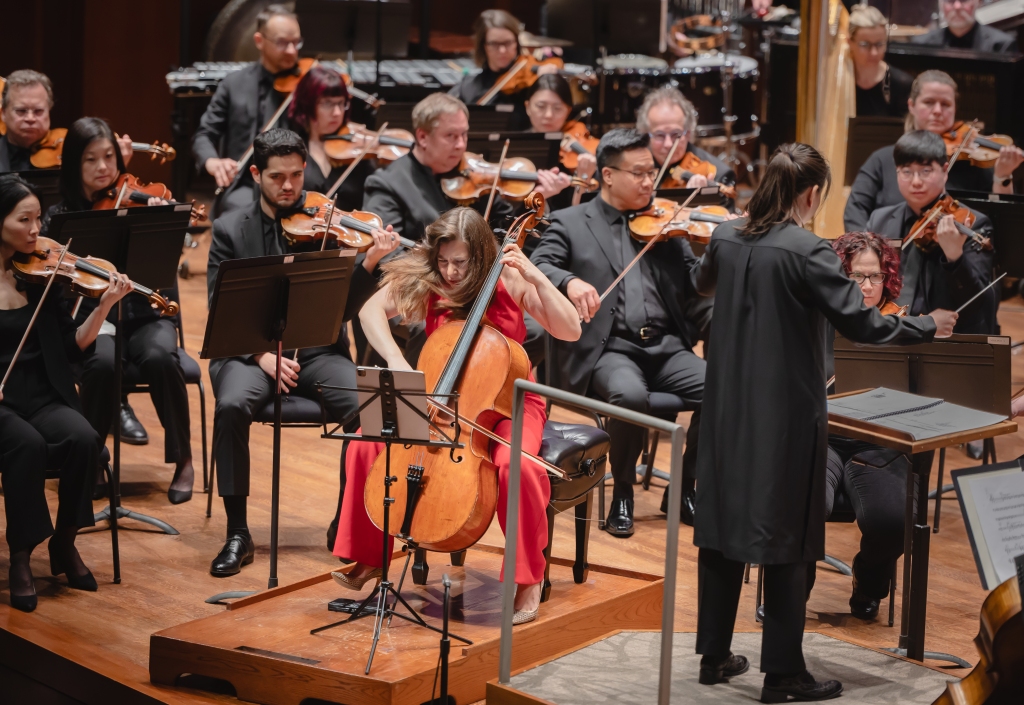
Thursday evening’s program with Seattle Symphony brought the season’s latest guest conductor, Shiyeon Sung, whose international career took off when she won the Sir Georg Solti International Conductors’ Competition in 2007. Typically introduced as the first female conductor from South Korea to achieve international renown, Sung brought musical intelligence and sensitivity to her collaboration with the players, beginning with an effervescent account of Carl Maria von Weber’s Oberon Overture.
Jeff Fair’s evocative “magic horn” call established the wonderland atmosphere of early German Romanticism, and Benjamin Lulich followed suit with his beautifully shaped clarinet solo. A few balance issues with the strings aside, Sung brought out the blend of wonder and zestful joy of Weber’s fine score from his last opera, which was written in English for the London stage and premiered in 1826 (the year of Mendelssohn’s Overture to A Midsummer Night’s Dream).
The evening’s other guest was the intrepid cellist Alisa Weilerstein (who made her belated Seattle Chamber Music Society debut last summer with memorable results). Performing as the soloist in Witold Lutosławski’s Cello Concerto is about much more than a fearless display of virtuosity. Clad in vivid red, Weilerstein inhabited the role of Lutosławski’s determined, feisty, and ultimately transcendent solo protagonist with passion and persuasiveness, underscoring the piece’s riveting theatricality.
Incredibly, this marked the SSO’s first-ever performance of the landmark concerto written by the Polish composer in 1970 for Mstislav Rostropovich. Weilerstein made a powerful case for the work, whose four movements unfold without a pause and call for strenuous, nearly continuous participation from the soloist. It is up to the cellist, for example, to hold our attention in an opening soliloquy lasting several minutes. Lutosławski indicated that this passage should be played “indifferently,” even frivolously, but Weilerstein intensified the suspense, her repeated D’s implying a ticking time bomb that is eventually set off by the brutal interruption of the brass.
At the same time, the cellist tapped into a deeply Romantic reserve of soul-stirring expression for the cantilena’s lyrical refuge. Always, though, Weilerstein projected a bravely independent and defiant persona, whether with insouciant pizzicatos or in her vertiginous flights in the uppermost register. The conductor is at times relegated to overseeing traffic control and cueing the aleatoric orchestral responses. Shiyeon Sung led the orchestra sympathetically, giving ample rein to the soloist. After the orchestra’s monstrous, full-force chord near the end, Weilerstein emerged in the epilogue with renewed energy and insistence, a voice crying out against the collective insanity.
As an encore, Weilerstein turned to her recent preoccupation with Bach’s Cello Suites (cf. her Fragments project), offering a moving interpretation of the Sarabande from Suite No. 4 that was especially notable for its unusual degree of probing fragility.
The program’s second half was devoted to Dvořák — the under-programmed Sixth Symphony of 1880, to be precise. Shiyeon Sung showed herself a wonderful colorist in possession of an admirable technique, eliciting Dvořák’s ingratiating blends of woodwinds with sensitivity and refinement, especially in the Adagio. The elegantly controlled diminuendo she shaped near the end of the first movement illuminated a major turning point in the symphonic journey before the concluding flare-up to full, joyful sonority. Rollicking energy dominated, as it should, in Dvořák’s scherzo, its furiant syncopations defiantly exuberant despite the minor key. Rambling detours make the finale the weakest part of the Sixth and pose a challenge to the conductor, but Sung guided the SSO through its leisurely musings with a sense of purpose.
Review (c) 2024 Thomas May
Filed under: Antonín Dvořák, conductors, review, Seattle Symphony


